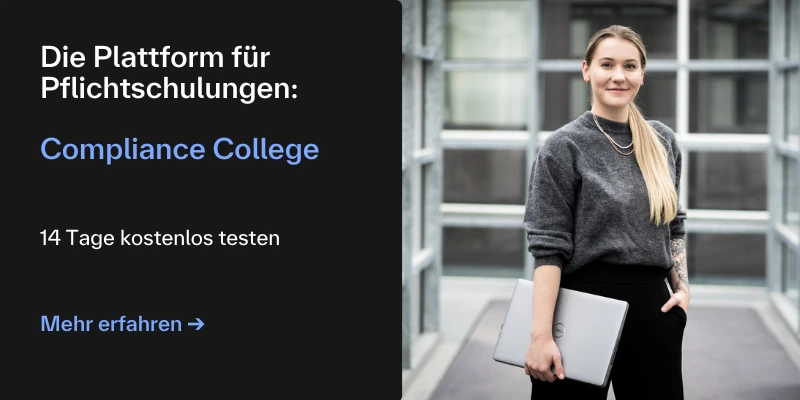Adaptive learning: increasing learning success with personalized training

Everyone learns differently - at different speeds, with different methods and on the basis of individual prior knowledge. Modern training concepts take this insight on board and focus on adaptivity: they systematically adapt learning content and paths to the personal development level of employees. This "adaptive learning" transforms in-company training and makes it significantly more effective. Find out more about this method and how you can use it in this article.
What does adaptive learning mean?
Adaptive learning is a training concept that breaks with the rigid one-size-fits-all method. Traditional approaches present the same content to all learners in the same order. With adaptive learning, on the other hand, learning content and learning paths are geared towards the individual level of knowledge, needs and progress of employees.
This definition of adaptive learning shows: The personalized approach significantly increases efficiency, especially in in-company training.
Core elements of adaptive learning
The learning path is at the heart of adaptive learning. It results from the interaction of various important components that adapt flexibly to the requirements of everyday business life:
- Learning content includes the specific topics and material to be taught.
- Learning formats describe the type of teaching, for example videos, texts or interactive exercises.
- Levels determine the degree of difficulty of the content.
- The learning sequence determines the logical order of the content.
Building blocks of adaptive learning in practice
The success of adaptive learning is based on various building blocks that can be flexibly combined depending on the learning objective and target group. The systematic linking of these components enables effective personalization of the learning process and adaptation to the individual needs of learners:
1. pre-tests and classifications
- Determination of the individual level of knowledge
- Identification of existing competencies
- Determining the optimum starting point
2. flexible learning paths
- Different routes through the learning material
- Adaptation to previous knowledge and learning success
- Differentiation between optional and mandatory content
3. learning nuggets
- Compact, self-contained learning units
- Flexible learning at your own pace
- Individual combination options
4. interactive feedback elements
- Regular comprehension questions
- Self-assessment options
- Direct feedback on learning progress
5. gamification elements
- Motivating progress indicators
- Integrated reward systems
- playful exercises
6. personalized repetitions
- Targeted refresher course on important topics
- Automatic reminder functions
- Demand-oriented specialization offers
Benefits for everyone: learn more efficiently, understand better
Adaptive learning systems are a win-win situation: they support employees in their individual development and help companies to make training more efficient.
Added value for employees: Learning at your own pace
With adaptive learning, employees benefit in particular from the personalized approach. They determine their own learning pace and can develop their skills in a targeted manner - without being over- or underchallenged.
The benefits for employees at a glance
✓ Individual progress thanks to customized learning paths
✓ Focus on relevant content instead of repeating familiar topics
✓ Direct feedback on learning success
✓ Flexible integration into everyday working life
✓ Higher motivation through tailored content

Benefits for companies: Efficient further training
Companies significantly increase the efficiency of their training with adaptive learning. Adapting to learners' different prior knowledge optimizes the use of resources.
The advantages for companies at a glance
✓ Optimized resource planning through needs-based training
✓ Targeted skills development in the team
✓ Reduced training times with the same learning outcome
✓ Transparent documentation of learning activities
✓ Sustainable anchoring of what has been learned
✓ Continuous improvement of content through systematic feedback
Tackling the challenges of adaptive learning in a targeted manner
The introduction of an adaptive learning system brings with it various challenges. These four areas are important for successful implementation: a suitable technological infrastructure, a supportive learning culture, high-quality learning content and a well thought-out data protection concept.
Technological infrastructure as a basis
The first step is to build a stable technical foundation. A modern Learning Management SystemLMS; learning management system) or a Learning Experience PlatformLXP; platform for learning experiences) supports the flexible design of learning paths and the organization of learning content.
Promoting a learning culture and team dynamics
An adaptive learning system only works if everyone is on board. Develop a culture in which learning takes center stage. Combine digital learning paths with blended learning (a mixture of online and face-to-face training) and social learning (learning in exchange with others). This promotes communication and strengthens team cohesion.
Optimize the quality and design of learning content
Developing adaptive learning paths means actively and flexibly designing content. Design your learning content in such a way that it can be easily integrated into individual learning paths. You can rely on external providers for interdisciplinary topics. Take advantage of the trend towards diverse learning formats, for example through the use of gamification, to make your training courses varied and targeted.
data privacy in the use of AI
Adaptive learning systems require the documentation of learning progress and behavior - this is the only way you can design individual learning paths for your employees. Advanced technologies such as artificial intelligence (AI) offer new possibilities for even more precise adaptations, but also entail additional data protection requirements.
Therefore, take special care to use the collected data exclusively to improve the learning process and to strike a balance between adaptivity and data privacy .
Technological perspectives for adaptive learning
Although adaptive learning is first and foremost a pedagogical concept, modern technologies provide useful support for its implementation. From simple rule-based systems to complex learning platforms - you can choose from a wide range of technological solutions.
Basics of technical implementation
Rule-based functions form the basis of adaptive learning systems: After a pre-test, the system classifies certain content as "optional" or "mandatory". In addition, the system can make further recommendations - similar to streaming services. The decision on the learning path always lies with the learners themselves.
New perspectives through AI
While adaptive learning also works in principle without AI, the use of artificial intelligence opens up additional possibilities. With these technologies, you can:
- Analyze learning patterns in more detail,
- Generate recommendations for further content,
- make predictions about successful learning strategies and
- refine the adaptation of learning paths.
As already described, you must pay particular attention to data privacy when using this technology. Only use the collected learning data to support the individual learning process - not for evaluation systems or social scoring (classification of people based on their behavior).
Practical example: The Compliance College
The Compliance College demonstrates how adaptive learning makes mandatory training more efficient. Compliance College. As an experienced partner, Haufe Akademie supports companies Haufe Akademie its comprehensive digital solution, transforming compliance training into practical and motivating learning experiences.
Efficient and sustainable training
Forget standardized one-size-fits-all courses. The Compliance College combines obligation with added value: thanks to the adaptive learning approach, you can significantly reduce the time required by your employees. Instead of having to work through all the content, they concentrate on the really relevant topics and close knowledge gaps in a targeted manner. This not only increases motivation, but also reduces costs for your company. Practical examples and varied media formats ensure lasting learning success for learners.

All compliance requirements in one solution
The Compliance College is a complete digital solution for instruction in companies. Those responsible benefit from these advantages:
- All topics requiring instruction in the areas of compliance, data privacy, IT security and occupational safety in one solution
- Legally compliant documentation and evidence for audits
- Practical e-learning with gamification elements and simulations
- Multilingual content for international teams
- and of course: the adaptive learning approach for maximum instructional efficiency
Conclusion: Shaping the future of in-company training
Adaptive learning marks a turning point in personnel development. It combines the best of both worlds: the efficiency of demand-oriented learning concepts with the individuality of personal development. Companies that rely on adaptive learning today create the basis for a sustainable learning culture - and at the same time increase the motivation of their employees and the efficiency of their training.
You might also be interested in










